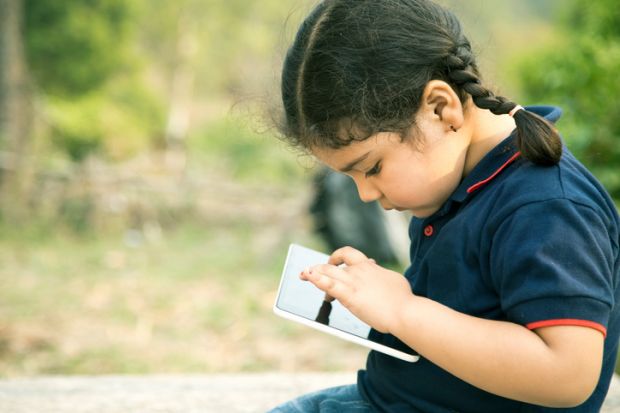The absence of a cautionary question mark in this book’s title presages a polemical account of the ways childhood is being eroded by digital technology. Wide-ranging in scope, this study aims to explore risk and responsibility in the digital worlds of home and school, although the voices of children and parents are heard only obliquely.
Despite Ofcom’s 2016 survey revealing that a clear majority of parents of children between eight and 15 feel that the benefits of the internet outweigh the risks, Sandra Leaton Gray and Andy Phippen cite collective parental anxiety about childhood as a motivation for their book. At its centre is a chapter on being safe online. With six tables and nine figures, it reads like a commissioned report, and some important points about governance and incident response mechanisms are lost as we trudge through an overview of an online safety tool. A quick Google search reveals that much of this content is drawn from a 2015 assessment of the tool written by Phippen, although it doesn’t appear in the references. Not only is this a bit of a swizz, it also leads to questions about the book’s intended readership. It is unlikely to be academics, and it is hard to see its appeal for the teachers or policymakers who may benefit from increased awareness of the challenges but prefer a crisper style.
Sections on sexting and biometric data are more successful. The legislation that empowers teachers to examine files and delete data on children’s electronic devices may come as a surprise, as will the use of fingerprint scanning and iris recognition for borrowing library books, managing cashless meals and monitoring attendance. The authors describe warranted concerns about consent, privacy and data security and point to the lack of training for teachers and school governors in this regulatory minefield. Readers will doubtless share their anxieties about the accumulation and management of personal data, although they may resist the technological determinism that underlies the authors’ concept of digital erosion and find scholar Ben Williamson’s work on “dataveillance” and algorithmic governance in schools more rewarding.
Numerous examples of Anglocentrism, in which the UK and England are used as synonyms, matter in a book that focuses on policy and regulation. While their overview of the legislative framework is useful, it is surprising that the authors make no references to the work of social psychologist Sonia Livingstone, whose EU Kids Online and Global Kids Online projects have had extensive impact on policy and unravel the opportunities and threats faced by children in a digital world.
There is an uneasy mix of good sense and hyperbole in Invisibly Blighted’s examination of the tensions encountered when children’s experience of the world is no longer curated by parents and teachers. The book’s closing manifesto includes 11 bullet points indicating topics that could form part of a revised national curriculum that deals more effectively with the role of technology in everyday life. However, its final calls for policy, practice and national coordination to acknowledge the challenges of growing up in the 21st century and to equip the next generation to live in an information age seem tame in light of its dystopian vision.
Lydia Plowman is dean of research in the College of Arts, Humanities and Social Sciences, University of Edinburgh.
Invisibly Blighted: The Digital Erosion of Childhood
By Sandra Leaton Gray and Andy Phippen
UCL IOE Press, 126pp, £19.99
ISBN 9781782770503
Published 27 March 2017
后记
Print headline: Growing up in front of a camera
